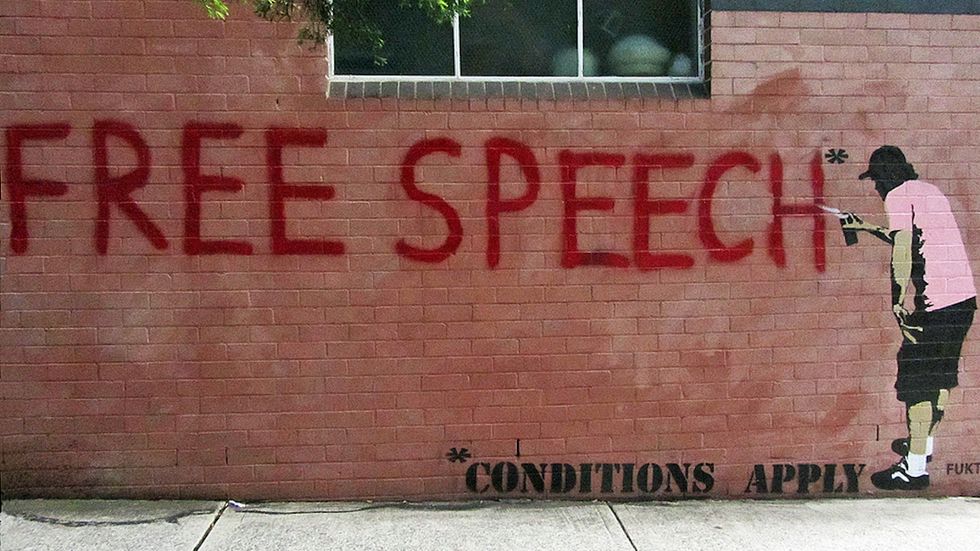
© 2024 Blaze Media LLC. All rights reserved.
The recent hubbub of whether to jump in and regulate information on social media reminds me of an old anecdote about Winston Churchill and his longtime political rival Clement Attlee:
Churchill enters a men’s room in the House of Commons and Attlee follows in behind him to accomplish the same task. Churchill, in response to Attlee’s entrance, moves as far away as possible.
“Feeling standoffish today, are we, Winston?” Attlee asks.
“That’s right,” Churchill responds. “Every time you see something big you want to nationalize it.”
Now, the American impulse isn’t necessarily to outright nationalize everything that gets too big, thank goodness (though we’ll sign off on a bailout in a heartbeat). Rather, it seems to be to regulate like there’s no friggin tomorrow when the actions of an unsympathetic corporation run afoul of our sensibilities.
Here’s where we are: A recent Vice Media investigation revealed that a handful of conservative Congressmen were, in fact, being “shadow banned” on Twitter. That is, they weren’t formally banned, but rather suppressed on search results.
In response, one of them has filed a complaint with the Federal Election Commission and another says that he’s looking into “legal remedies” to the situation.
Twitter responded to the accusations of shadow banning with a statement that makes it sound like they do quite a bit of shadow banning.
Elsewhere in the GOP House conference, Majority Leader Kevin McCarthy has openly suggested that Twitter’s CEO outright ban a democratic House candidate for a truly vile remark he made about First Lady Melania Trump.
Okay, let’s pump the brakes.
We know that Silicon Valley types lean heavily to the left and that the way most of these platforms are run hasn’t been in favor of conservatives in the past and this is just the latest episode in a long train of abuses against right-leaning ideas and voices on social media.
I can see the merit in Victor Davis Hanson’s position that these tech companies have a quasi-monopoly on the market and should be dealt with as such. The impact that these platforms would have on our daily life, our culture and our politics just ten years ago was grossly underestimated to say the least.
The appeal is very clear as it would address a clear viewpoint discrimination against conservatives and #OwnTheLibs at the same time. And, of course, some Democrats will find political cover in regulating the silicon giants because of the proliferation of Russian advertisements during the 2016 election that has yet to be fully avenged.
I remain unconvinced.
First off, it’s hard to see how antitrust standards used against traditional communications companies could be properly applied to social media platforms, and whether those standards would even be reasonable assessments of whether or not a social media company held a monopoly.
But the bigger question is whether it’s just and prudent for conservatives to use these justifications to get Uncle Government to head over to Twitter and Facebook and dictate how they ought to present content on their own product.
It’s hard to see how such an effort wouldn’t amount to coerced speech in the same vein as the kind that conservatives overwhelmingly opposed in two recent Supreme Court cases. Sure, major tech companies are far less sympathetic than mom and pop bakeries and pro-life centers, but the rights ought to be the same.
This is where it helps to keep in mind that the history of human government teaches that it’s generally a bad idea to create political power that one wouldn’t want wielded by one’s political opponents. Keep in mind that we have elections every couple of years in this country and the other guys have no problem telling private companies what to do with their property and arbitrarily outlawing things at will.
Sure, there are huge, evident problems with how capriciously and lopsidedly the tech giants deal with information that doesn’t fit into the Silicon Valley mainstream; but, with a flourishing social media market in which people can choose to get their information from any number of platforms, there’s still plenty of room for competition and disruption.
Recently, we have seen at least a superficial attempt at course-correction from the tech world, Facebook even took flack from the ever-sanctimonious “Buzzfeed Ben” over how many conservative news outlets were invited to a closed-door meeting with the company. This is what happens when public pressure and market forces are applied.
Admittedly, it’s not a sea-change by any measure, but it’s a start, and a far better one than deputizing any federal speech police.
#mc_embed_signup{background:#fff; clear:left; font:14px}
/* Add your own MailChimp form style overrides in your site stylesheet or in this style block.
We recommend moving this block and the preceding CSS link to the HEAD of your HTML file. */
Want to leave a tip?
We answer to you. Help keep our content free of advertisers and big tech censorship by leaving a tip today.
Want to join the conversation?
Already a subscriber?
more stories
Sign up for the Blaze newsletter
By signing up, you agree to our Privacy Policy and Terms of Use, and agree to receive content that may sometimes include advertisements. You may opt out at any time.
© 2024 Blaze Media LLC. All rights reserved.
Get the stories that matter most delivered directly to your inbox.
By signing up, you agree to our Privacy Policy and Terms of Use, and agree to receive content that may sometimes include advertisements. You may opt out at any time.



